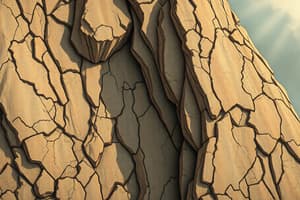Podcast
Questions and Answers
What is weathering?
What is weathering?
- The movement of rocks and minerals
- The deterioration of rocks, soils, and minerals through contact with water, atmospheric gases, and biological organisms (correct)
- The study of rocks and minerals
- The creation of rocks and minerals
What are the two types of weathering processes?
What are the two types of weathering processes?
- Mechanical and chemical
- Chemical and biological
- Biological and mechanical
- Physical and chemical (correct)
Which type of physical weathering is the most important?
Which type of physical weathering is the most important?
- Exfoliation
- Freeze-thaw weathering (correct)
- Thermal fracturing
- Abrasion
What is the principal agent of chemical weathering?
What is the principal agent of chemical weathering?
What is dissolution?
What is dissolution?
What is carbonate dissolution?
What is carbonate dissolution?
What is hydrolysis?
What is hydrolysis?
What are some living organisms that contribute to weathering?
What are some living organisms that contribute to weathering?
What is the chemical index of alteration?
What is the chemical index of alteration?
Flashcards
Weathering Definition
Weathering Definition
The breakdown of rocks, soils, and minerals through contact with water, atmospheric gases, and biological organisms.
Physical Weathering
Physical Weathering
The process of breaking down rocks and soils through mechanical forces like freezing and thawing, or abrasion.
Chemical Weathering
Chemical Weathering
The process of breaking down rocks and soils through chemical reactions like dissolution, hydrolysis, or oxidation.
Frost Weathering
Frost Weathering
Signup and view all the flashcards
Dissolution
Dissolution
Signup and view all the flashcards
Hydrolysis
Hydrolysis
Signup and view all the flashcards
Biological Weathering
Biological Weathering
Signup and view all the flashcards
Chemical Index of Alteration
Chemical Index of Alteration
Signup and view all the flashcards
Paleosols
Paleosols
Signup and view all the flashcards
Study Notes
Weathering: The Deterioration of Rocks and Minerals
-
Weathering is the deterioration of rocks, soils, and minerals through contact with water, atmospheric gases, and biological organisms.
-
Weathering processes are divided into physical and chemical weathering.
-
Physical weathering involves the breakdown of rocks and soils through mechanical effects and includes freeze-thaw weathering and thermal fracturing.
-
Frost weathering is the most important form of physical weathering and is caused by the formation of ice within rock outcrops.
-
Chemical weathering involves the chemical reaction of water, atmospheric gases, and biologically produced chemicals with rocks and soils.
-
Water is the principal agent of chemical weathering, converting many primary minerals to clay minerals or hydrated oxides via reactions collectively described as hydrolysis.
-
Dissolution is the process in which a mineral dissolves completely without producing any new solid substance.
-
Carbonate dissolution is an important feature of glacial weathering and affects rocks containing calcium carbonate, such as limestone and chalk.
-
Hydrolysis is a form of chemical weathering in which only part of a mineral is taken into solution.
-
Carbon dioxide that dissolves in water to form carbonic acid is the most important source of protons, but organic acids are also important natural sources of acidity.
-
Living organisms may contribute to mechanical weathering, as well as chemical weathering, and include lichens and mosses.
-
Weathering is a crucial part of the rock cycle, and sedimentary rock, formed from the weathering products of older rock, covers 66% of the Earth's continents and much of its ocean floor.Weathering: The Process of Breaking Down Rocks and Minerals
-
Weathering is the process of breaking down rocks and minerals.
-
Weathering occurs through various chemical, physical, and biological processes.
-
Chemical weathering includes dissolution, hydrolysis, oxidation, and hydration.
-
Physical weathering includes freeze-thaw cycles, abrasion, and exfoliation.
-
Biological weathering includes the release of chelating compounds, carbon dioxide, and organic acids by plants and soil microorganisms.
-
Buildings made of stone, brick, or concrete are susceptible to weathering, which can be accelerated in areas affected by acid rain.
-
Accelerated building weathering can be a threat to the environment and occupant safety.
-
The degree of weathering of a soil can be expressed as the chemical index of alteration.
-
Wood can be physically and chemically weathered by hydrolysis and other processes.
-
Weathering of non-geological materials occurs through photochemical reactions.
-
The process of weathering takes between 100 and 1,000 years.
-
Paleosols are fossil soils that can be identified in formations as old as Archean.
Studying That Suits You
Use AI to generate personalized quizzes and flashcards to suit your learning preferences.




